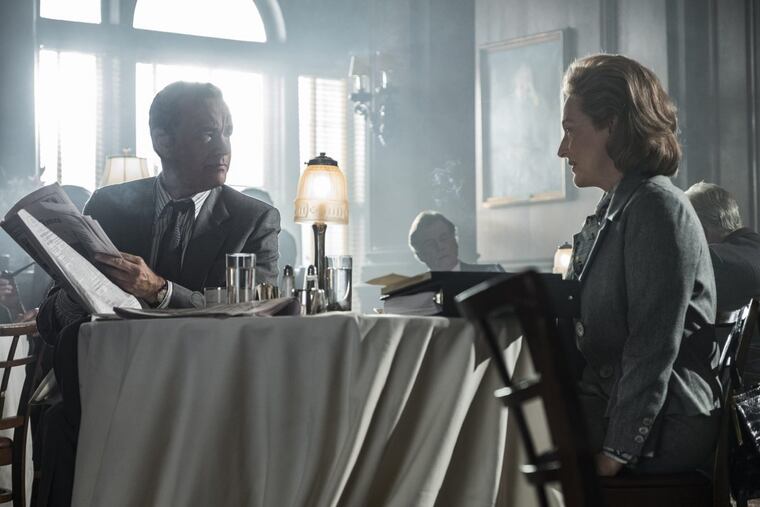'The Post': Tom Hanks and Meryl Streep star in Steven Spielberg's stirring newsroom drama
'The Post' is Steven Spielberg's brisk, glossy account of the Washington Post publishing the Pentagon Papers and telling the Nixon administration to stuff it.

A confluence of talent like Steven Spielberg, Tom Hanks, and Meryl Streep usually points to something massive — a project years in the making, costing zillions, and about as maneuverable as a super-tanker.
Spielberg, in fact, was working on one such project — the virtual-reality sci-fi extravaganza Ready Player One — when he saw the script for The Post, and was so taken with it he decided to hit pause on his tentpole project and make The Post immediately, enlisting Hanks and Streep.
The Post is the story of the Washington Post (and the New York Times) challenging a Nixon administration attempt in 1971 to block publication of the top-secret Pentagon Papers, which revealed that America's political leaders were pouring men and money into a Vietnam War they viewed as unwinnable.
To Spielberg, The Post isn't just history — it's a timely opportunity to express full-throated support for the First Amendment and press freedom at a time when both are held in apparently low regard by the current occupant of the Oval Office, who likes to post Photoshopped videos of himself body-slamming reporters (Montana's Upper Merion-born and raised Congressman Greg Gianforte was recently elected on that same platform).
Spielberg and Co. are obviously excited to be making The Post, and that palpable enthusiasm makes the movie feel so unusually lively for a big-studio movie. It's nimble, crisp, passionate, full of verve and invention. Put another way: It's a newspaper movie that feels like something made by hustling professionals. On deadline.
Spielberg is telling two stories here. The first is the as-advertised account of the Washington Post newsroom, led by editor Ben Bradlee (Hanks), striving to chase the New York Times' big Pentagon Papers scoop. Portions have been published, but an injunction has prevented the Times from printing the rest.
Bradlee wants to find and publish the best of what remains, and sends his army of reporters (led by Bob Odenkirk, Carrie Coon, David Cross) to find it. Bradlee wants the scoop, but he also wants to elevate the reputation of the Post as a provincial publication for Washington, D.C., insiders and elites (the movie opens with a debate over how to cover Tricia Nixon's wedding).
Spielberg also gives us a parallel story — that of the Post's publisher, Katharine Graham (Streep), who has inherited the paper from her husband and father, and is struggling to make herself heard in a world of swaggering alpha males.
They include pushy newsman Bradlee, a know-it-all lawyer (Bradley Whitford) and worried financiers — Bradlee's (possibly illegal) bid to publish classified government documents comes just as Graham seeks to sell stock to investors.
Spielberg and Streep find myriad ways to give this aspect of the story heft — Streep makes her voice tiny, her movements timid, and Spielberg finds endless visual ways to remind us that she's the only woman in a room full of bossy men. All leading to a scene of Graham holding up a patrician hand and waving away a room full of stunned mansplainers.
Read more: The day in 1971 when the Inquirer defied the government and published the Pentagon Papers
It's a nice moment, even though Graham is not the most galvanizing icon of female empowerment, having overcome the dual handicaps of wealth and inherited power. She views the glass ceiling by standing on it.
Still, these scenes make a more subtle point: It takes more than reporters and gumption to defend the First Amendment. It takes money. Money to pay an expensive army of lawyers who fight other powerful factions in court.
Currently, the Post is owned by an individual worth $99 billion. So maybe money is no object. (Alexa, read me the Pentagon Papers.)
Other news outlets are scrambling to find ways to pay for the kind of journalism that Justice Hugo Black, in his ruling telling Nixon to buzz off, defended using these words: "The Founding Fathers gave the press the protection it must have to fulfill its essential role in our democracy. The press was to serve the governed, not the governors. The government's power to censor the press was abolished so that the press would remain forever free to censure the government."
His concurring opinion is featured in the climactic moments of The Post, which closes with every print journalist's favorite money shot.
Look at those papers rolling off the press. And look at those ads!